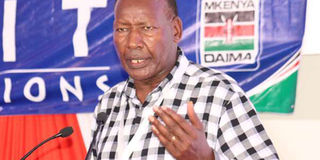All Kenyans want peace, and polls that are credible will give them that

Interior Cabinet Secretary Joseph Nkaissery addresses delegates during a Leadership Summit at Leisure Lodge Resort in Kwale on December 2, 2016. Emphasising peace at the expense of credibility is a recipe for disaster. PHOTO | WACHIRA MWANGI | NATION MEDIA GROUP
What you need to know:
- No serious discussion of election campaign financing can ignore the role of private business people in supporting contestants.
- Given the reward system associated with our politics, the private sector is more often in alliance with the incumbent than with the other political actors.
Last week, the Kenya Private Sector Alliance (Kepsa) held a conference on elections, whose key focus was peace.
This accent on peace seems to ignore the fact that peace is guaranteed if the electoral process is credible and legitimate.
But legitimacy is not what excites Kepsa’s curiosity.
Indeed, legitimacy is not what excites most regime-oriented institutions.
One of the challenges we face as a country is that private actors and institutions of consequence want to play partisan political games with the electoral process while expecting to reap credible results.
And in the particular case of Kepsa, partisan interests seem to drive its thinking on the broad spectrum of its concerns, from corruption on the one hand to elections on the other.
Its civic duty is often sacrificed on the altar of private gain.
Anyone with a memory worth the name will recall that the Waki Commission recorded untold cases of impunity.
Some of these had accumulated over years, producing deep-seated suspicion of government and it core agencies.
They also resulted in deeply ingrained suspicion of most institutions that should play a critical role in mediating disputes, including the church.
So suspect were most institutions in the eyes of the public in 2007, that few are those Kenyans who felt that seeking redress in court over election dispute was meaningful at all.
A DEEP NEXUS
The private sector plays a significant role in electioneering.
No serious discussion of election campaign financing can ignore the role of private business people in supporting contestants.
In the “Kanu-is-supreme” days, this support was almost always forcefully extracted.
Today, the pressure to support government is less so; individual businesses can decide how to channel funds into election campaigns.
However, cunning business actors do offer support both ways, considering this to be astute business strategy, given the critical role the state plays in the success or failure of most corporate businesses.
The idea is that whoever comes to power ought to be sufficiently ‘greased’ to be able to look with favour at such businesses.
Indeed, this is the story of the wheeling and dealing informing the relationship between the state and private business actors.
Where government is sufficiently happy with a particular business, not only does it receive preferential treatment, the corners it cuts in providing service in the public sector will either be excused or ignored.
In other words, contrary to its posturing, the private sector is not disinterested in politics.
It is inextricably linked to the electoral process where its private profit interests loom large.
Given the reward system associated with our politics, the private sector is more often in alliance with the incumbent than with the other political actors.
In fact, the private business sector tends to have a dismissive view of civil society until pushed to acknowledge the latter.
Sure enough, for the just concluded Kepsa meeting, civil society largely received last-minute invitations, as if they were an after-thought.
DO IT RIGHT
The Cord statement turning down Kepsa’s invitation articulated its displeasure with Kepsa’s partisanship.
Observers at the meeting could be forgiven for accepting this assessment, especially given the open partisanship displayed by prominent speakers at the convening such as the supposedly “non-political” Cabinet Secretary of Internal Security who aggressively chastised those who disagreed with his perspective.
Indeed, the chairman of the Editors Guild, Linus Kaikai, came under and responded to such fire.
He asked why Kepsa would have a conference affirming the ideal of “speaking truth to power” but facilitating overt hostility when uncomfortable truths were spoken.
Kepsa must know that credible elections automatically encompass peaceful outcomes.
Emphasising peace at the expense of credibility is a recipe for disaster.
Partisanship of any one critical actor not only biases the electoral process but invites citizens to wonder where one’s civic duty rests.
As such, private choices of individual members must not be conflated with the civic responsibility of the overall organisation.
Godwin R. Murunga is a senior research fellow in the Institute for Development Studies, University of Nairobi





